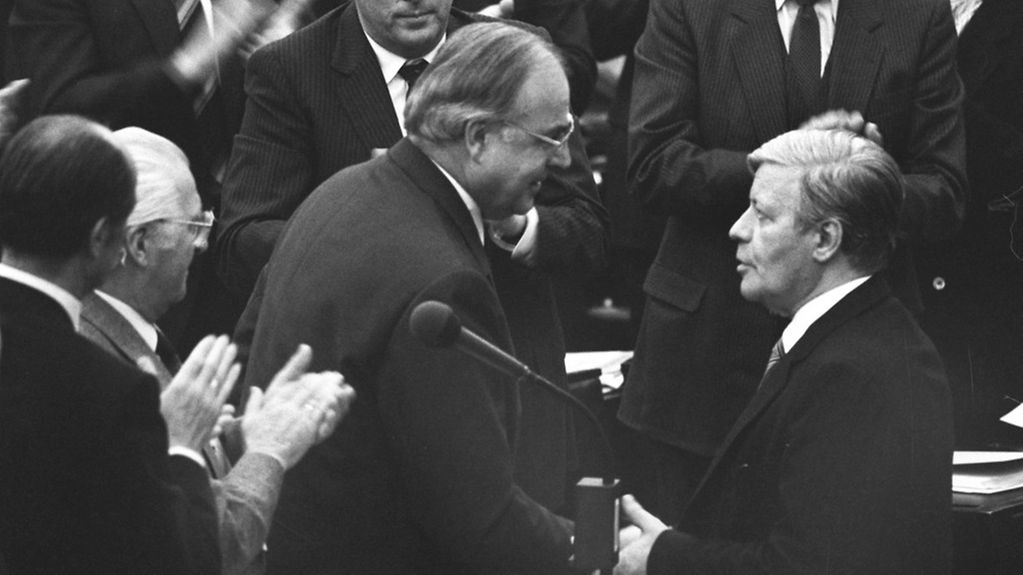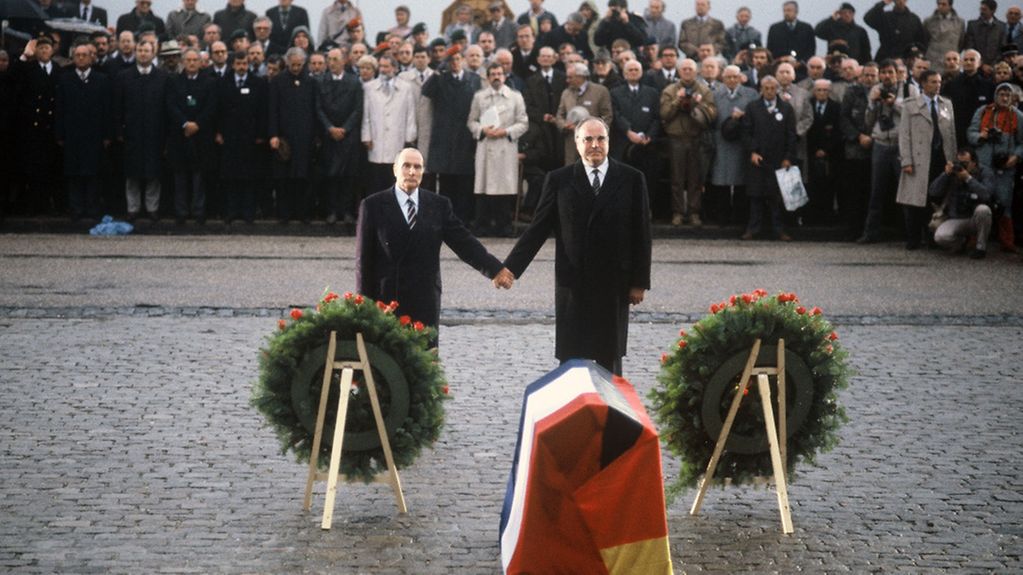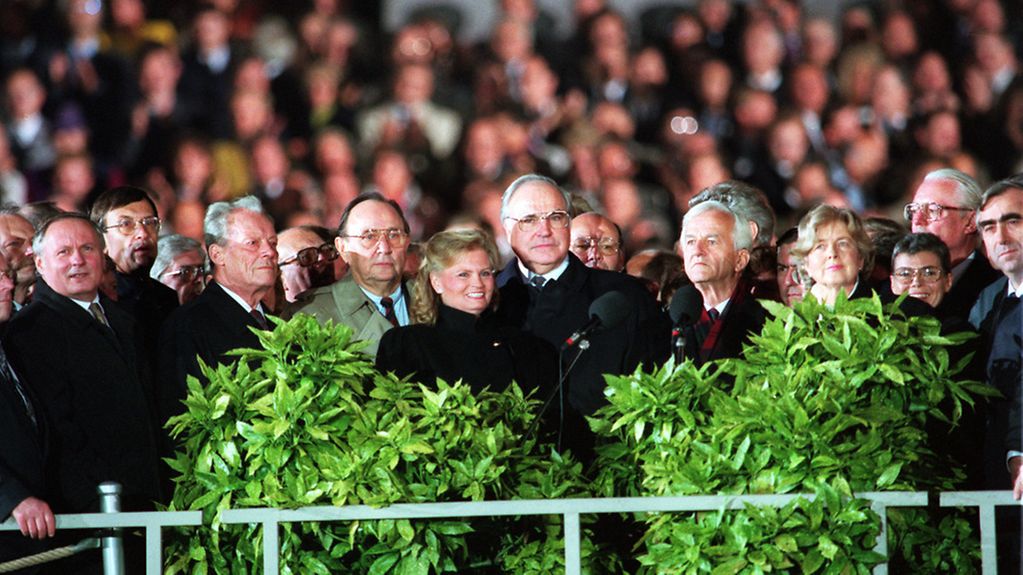On the death of Helmut Kohl
For 16 years Helmut Kohl was German Chancellor. His term in office will always be linked to the happiest event in modern German history: following the peaceful revolution in the German Democratic Republic, and the fall of the Berlin Wall, Helmut Kohl managed to reunite Germany in peace and liberty after decades of division.
4 min reading time
In 1973 Helmut Kohl was appointed Federal Chairman of the CDU. The CDU/CSU made the former state premier of Rhineland-Palatinate their candidate for Chancellor in the 1976 elections, in which they just missed an absolute majority. The CDU/CSU parliamentary group in the German Bundestag elected Helmut Kohl as Chairman.
A book of condolence for the former Chancellor Helmut Kohl will be open to sign from Sunday 18 June to Friday 23 June.
Unification Chancellor and honorary citizen of Europe

After a vote of no confidence in Helmut Schmidt, Helmut Kohl becomes Chancellor
Photo: Bundesregierung/Wegmann
Chancellor Helmut Schmidt was initially able to continue the SPD/FDP coalition after the parliamentary elections in 1980, but the coalition collapsed in 1982 amid disagreements over NATO’s twin track decision and the course of economic policy. Helmut Kohl and the Chairman of the FDP, Hans-Dietrich Genscher, agreed to form a CDU/CSU-FDP coalition. On 1 October 1982 the German Bundestag voted Helmut Kohl into office as the sixth Chancellor of the Federal Republic of Germany. The early parliamentary elections in March 1983 confirmed the CDU/CSU and FDP government in office.
Through budget consolidation and economical management, the coalition laid the foundations for a lasting economic upswing. Economic growth generated new jobs and made it possible to cut taxes and introduce new benefits for families. The stable economic basis made it easier to rebuild the East after reunification in 1990.

Helmut Kohl and François Mitterrand honour the memories of the soldiers killed in the World Wars
Photo: Bundesregierung/Schulze-Vorberg
The government of Helmut Kohl continued the policy of détente towards the states of the Eastern bloc, while deepening transatlantic relations. In 1983 it supported NATO’s twin track decision, helping to have it adopted. Helmut Kohl attached special importance to Germany’s further reconciliation with France. The photograph of Helmut Kohl and French President François Mitterrand holding hands across the graves of Verdun is still highly symbolic today.
After the Berlin Wall fell on 9 November 1989, Helmut Kohl recognised the opportunity to restore German unity. He drew up a "10-point plan" and spent the following weeks and months pushing for a swift reunification vis à vis western allies and the Soviet Union as it was then. He managed to persuade European leaders by stressing time and time again that German unity and European unification were "two sides of the same coin". In summer 1990 Helmut Kohl managed to move the Soviet President Mikhail Gorbachev to give his assurances that the reunified Germany could decide itself which alliance it wished to belong to.

On 3 October 1990 Germany is reunited after decades of division
Photo: Bundesregierung/Stutterheim
The fact that the German people were able to come together again after more than forty years with the approval of all partners and allies in peace and in liberty brought Helmut Kohl the epithet "Kanzler der Einheit" – the Unification Chancellor.
After the first election in which all Germans in East and West were free to vote on 2 December 1990, Helmut Kohl remained Chancellor – making him the first Chancellor of the reunited Germany. With great enthusiasm and commitment, he dedicated his next two terms of office above all to rebuilding the East, with the "Aufbau Ost" programme. It was a stony path. As Helmut Kohl later admitted, even he had seriously overestimated the health of the East German economy.
With a huge amount of energy, Helmut Kohl also forged ahead with the unification of Europe. Swift progress was made, including the creation of the European Monetary Union by the 1992 Maastricht Treaty.
The Kohl era came to an end after 16 years with the parliamentary elections in 1998. Helmut Kohl ruled longer than even Konrad Adenauer. He remained a member of the German Bundestag until the end of that legislative period in 2002.
Helmut Kohl received a great many awards and honours in the course of his career. For his services to Europe and his role as one of the "founding fathers" of the euro, the EU heads of state and government made him an "honorary citizen of Europe" in 1998. The New York based East West Institute named him Statesman of the Decade, and. Bill Clinton awarded him the Medal of Freedom, the highest civilian honour in the USA.
Helmut Kohl
Born on 3 April 1930 in Ludwigshafen
1959 to 1976 Member of the state parliament of Rhineland-Palatinate
1969 to 1976 State Premier of Rhineland-Palatinate
1973 to 1998 Federal Chairman of the CDU
1976 to 2002 Member of the German Bundestag
1976 to 1982 Chairman of the CDU/CSU parliamentary group in the German Bundestag
1982 to 1998 Chancellor
Died on 16 June 2017 in Ludwigshafen